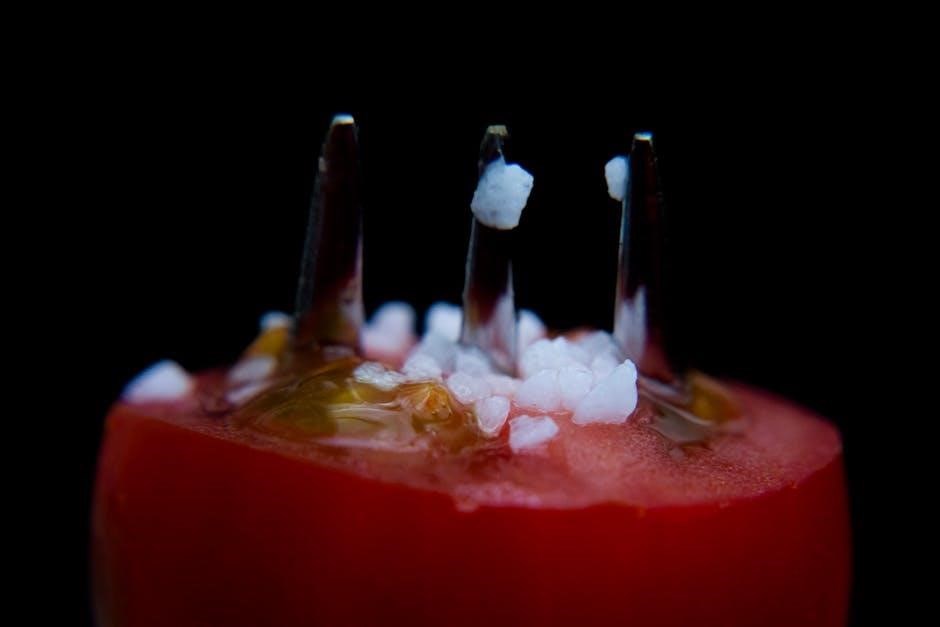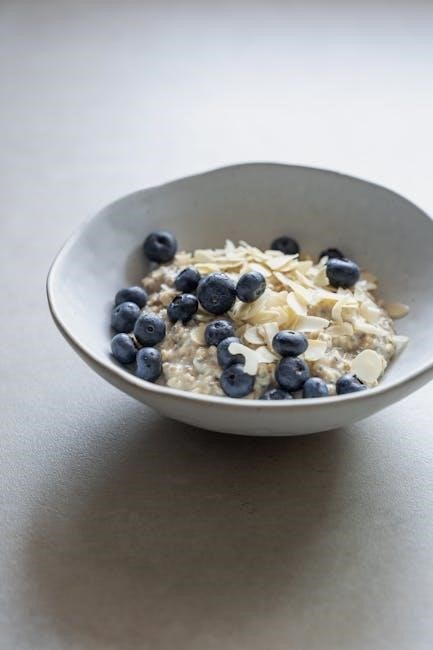A renal diet is a customized eating plan for dialysis patients, focusing on managing protein, phosphorus, potassium, and sodium intake to support kidney health and overall well-being.
Importance of Moderation in the Renal Diet
Moderation is key to a successful renal diet. Enjoy all foods in moderation to maintain a balanced intake without overconsumption of restricted nutrients.
2.1. Key Principles of the Renal Diet
The renal diet focuses on controlling protein, phosphorus, potassium, and sodium intake. Emphasize high-quality protein sources like lean meats and fish, and prioritize whole, unprocessed foods. Limit fluids to 8-10 glasses daily and avoid high-sodium foods. Work closely with a dietitian to tailor the diet to individual needs, ensuring proper nutrition while managing kidney function and overall health effectively.
2.2. Role of a Registered Dietitian in Meal Planning
A registered dietitian specializes in creating personalized meal plans for dialysis patients, ensuring nutrient balance and adherence to renal dietary guidelines. They assess individual needs, monitor lab results, and adjust plans to optimize health outcomes. Dietitians also educate patients on food choices and supplement use, such as dialysis-specific vitamins, to prevent deficiencies and manage symptoms effectively.

Protein Requirements for Dialysis Patients
Dialysis patients require adequate protein to maintain muscle mass and overall health. The recommended intake is typically 0.8-1.2 grams of protein per kilogram of body weight daily, focusing on high-quality sources like lean meats and fish to support energy needs and prevent malnutrition.
3.1. Recommended Daily Protein Intake
Dialysis patients typically require 0.8-1.2 grams of protein per kilogram of body weight daily. High-quality protein sources, such as lean meats, fish, eggs, and dairy, are recommended to maintain muscle mass and energy levels. Plant-based options like beans and grains can also be included. Adequate protein intake helps prevent malnutrition and supports overall health, while excessive intake may strain the body. A registered dietitian can help tailor protein needs to individual requirements.
3.2. Sources of High-Quality Protein
High-quality protein sources include lean meats, fish, eggs, and dairy products, which are low in phosphorus and sodium. Plant-based options like beans and grains can also be included but should be consumed in moderation due to their higher phosphorus content. These proteins help maintain muscle mass and energy levels, essential for dialysis patients. Always consult a registered dietitian to tailor protein intake to individual needs and ensure proper nutrient balance.
Managing Phosphorus and Potassium
Dialysis patients must limit phosphorus and potassium to prevent complications like bone disease and heart issues. Restricting these minerals helps maintain healthy blood levels and overall well-being.
4.1. Understanding Phosphorus Restrictions
Phosphorus restrictions are crucial for dialysis patients to prevent bone disease and calcium imbalances. High phosphorus levels can damage bones and arteries. Foods like dairy, nuts, and processed foods are high in phosphorus. Patients are advised to limit intake and use phosphorus binders to manage absorption. The recommended daily limit varies, but strict monitoring is essential to maintain healthy blood levels and avoid complications. Regular blood tests help track phosphorus levels.
4.2. Potassium-Restricted Foods and Alternatives
Dialysis patients must limit potassium intake to avoid heart risks. Foods high in potassium, such as bananas, oranges, spinach, and potatoes, should be avoided. Suitable alternatives include apples, green beans, and cauliflower. Portion control is key, even for lower-potassium options. Regular blood tests ensure potassium levels remain stable, helping patients maintain a balanced and safe diet while on dialysis.

Fluid and Sodium Management
Managing fluid and sodium is crucial for dialysis patients. Limit sodium intake to 3 grams daily and avoid salty foods. Control fluid balance to prevent complications.
5.1. Importance of Fluid Balance
Fluid balance is critical for dialysis patients to prevent complications like hypertension and edema. Excess fluid can strain the heart and blood vessels. Dialysis removes excess fluid, but managing intake is essential. Patients should monitor daily fluid consumption and avoid salty foods that increase thirst. Proper fluid management helps maintain blood pressure and reduces strain on the cardiovascular system, improving overall health and dialysis effectiveness.
5.2. Sodium Guidelines for Dialysis Patients
Dialysis patients should limit sodium intake to 2,000 mg daily to control blood pressure and fluid retention. Excess sodium increases thirst, leading to excessive fluid consumption. Avoid processed foods and salty seasonings. Opt for low-sodium alternatives or herbs for flavor. Monitoring sodium helps prevent complications like hypertension and edema, ensuring better overall health and dialysis efficiency.

Vitamin and Mineral Supplements
Dialysis patients often require vitamin and mineral supplements, especially B and C vitamins, as dialysis removes these nutrients. Supplements should be taken after treatments to maintain adequate levels.
6.1. Essential Vitamins for Dialysis Patients
Dialysis patients require vitamin B and C supplements to replace nutrients lost during treatment. Vitamin D is also crucial for bone health. Supplements should be taken after dialysis to ensure optimal absorption and maintain proper nutrient levels. Always consult a healthcare provider for personalized recommendations.
6.2. Role of Phosphate Binders
Phosphate binders are medications that help control high phosphorus levels in dialysis patients by binding to dietary phosphorus in the digestive tract, preventing its absorption. They are essential for managing hyperphosphatemia and reducing the risk of complications like bone disease. Phosphate binders should be taken as directed, typically with meals, to maximize their effectiveness and support overall kidney health.

Food Choices for a Kidney-Friendly Diet
A kidney-friendly diet emphasizes lean proteins, low-sodium options, and limited potassium and phosphorus. It encourages whole grains, fresh vegetables, and fruits while avoiding processed foods and excessive salt.
7.1. Allowed Foods for Dialysis Patients
Dialysis patients can enjoy lean proteins like chicken, fish, and eggs, as well as low-fat dairy products. Whole grains, fresh vegetables, and fruits are also encouraged. Low-potassium and low-phosphorus foods, such as green beans and berries, are ideal. Portion control is crucial, and sodium intake should be limited to avoid fluid retention. Fresh herbs and spices can enhance flavor without adding excess salt or harmful nutrients.
7.2. Foods to Avoid or Limit
Dialysis patients should limit foods high in sodium, phosphorus, and potassium. Avoid processed meats, canned goods, and salty snacks. High-potassium foods like bananas, oranges, and spinach should be restricted. Dairy products, organ meats, and certain vegetables like potatoes and tomatoes may also need to be limited. Excessive fluid intake and high-sugar foods should be avoided to prevent complications. Always consult a dietitian for personalized restrictions based on individual needs.
Sample Meal Plans for Dialysis Patients
A kidney-friendly diet includes meals low in sodium, phosphorus, and potassium. Breakfast options like scrambled eggs with rice and green beans are ideal. For dinner, grilled chicken with roasted vegetables like carrots and zucchini is recommended. Portion control and fluid balance are key. Always consult a dietitian to tailor meals to individual needs for optimal health and dialysis management.
8.1. Breakfast Options
Breakfast for dialysis patients should focus on low-sodium, low-phosphorus, and low-potassium foods. Scrambled eggs with rice and green beans are a great start. Oatmeal with a small portion of berries is another option. Whole-grain toast with a teaspoon of jam can be included. Avoid high-potassium fruits like bananas and oranges. Use herbs to season instead of salt. Portion control is essential, and meals should be tailored to individual dietary needs. Always consult a dietitian for personalized plans.
8.2. Lunch and Dinner Ideas
For lunch and dinner, focus on balanced meals with lean proteins, low-potassium vegetables, and whole grains. Grilled chicken with steamed green beans and brown rice is a nutritious option. Baked fish with roasted cauliflower and quinoa also works well. Salads with mixed greens, cucumbers, and low-sodium dressings are ideal. Avoid high-sodium condiments and season with herbs instead. Portion control is crucial, and meals should align with individual dietary restrictions. Always consult a dietitian for personalized recommendations.
Monitoring and Adjusting the Diet
Regular blood tests help track nutrient levels, guiding dietary adjustments. Work closely with a dietitian to modify protein, phosphorus, and potassium intake based on lab results and health changes.
9;1. Regular Blood Tests and Dietary Adjustments
Regular blood tests are crucial for monitoring potassium, phosphorus, and protein levels in dialysis patients; These tests help identify imbalances, enabling dietitians to adjust meal plans accordingly. Elevated levels may require stricter limits on certain foods, while low levels might necessitate additions. For example, if blood tests show high potassium, foods like bananas and oranges may need to be reduced. Similarly, phosphorus levels can guide adjustments in dairy or processed food intake. Protein intake may also be fine-tuned based on nitrogen levels, ensuring adequate nutrition without overburdening the body. This ongoing process ensures the diet remains balanced and effective, supporting overall health and dialysis efficiency. Collaborating with a dietitian is essential for making informed, personalized adjustments based on lab results and individual needs.
9.2. Tracking Nutrient Intake
Tracking nutrient intake is vital for dialysis patients to maintain protein, phosphorus, and potassium balance; Using a food diary or mobile app can help monitor daily consumption. Patients should record portions and types of food eaten, ensuring they meet dietary goals. This practice helps identify patterns and potential overconsumption of restricted nutrients, allowing for timely adjustments. Regular reviews with a dietitian can refine meal plans and ensure optimal nutrient levels, promoting better health outcomes and dialysis efficiency.

Special Considerations for Different Patient Groups
Dialysis patients with unique needs, such as the elderly or those at risk of malnutrition, require tailored dietary approaches to address specific health challenges and ensure proper nutrition.
10.1. Nutritional Needs for Elderly Dialysis Patients
Elderly dialysis patients often face unique challenges, including muscle wasting and malnutrition. Their diet should emphasize high-quality protein to maintain muscle mass and strength. Additionally, they may require adjustments in calorie and electrolyte intake due to age-related changes in metabolism and digestive efficiency. Regular monitoring by a dietitian is essential to tailor nutritional plans and prevent complications associated with malnutrition in this vulnerable population.
10.2. Managing Weight and Malnutrition
Malnutrition is common in dialysis patients, affecting up to 75% of those with chronic kidney disease. It is crucial to ensure adequate calorie and protein intake to prevent muscle wasting and weight loss. Personalized meal plans, often tailored by dietitians, can help patients meet their nutritional needs. Supplements, including vitamins and minerals, are frequently recommended to address deficiencies. Regular monitoring of weight and blood markers is essential to prevent complications and maintain overall health.

The Role of Dialysis in Nutritional Management
Dialysis removes waste products and excess nutrients, impacting the body’s balance of essential vitamins and minerals. Post-dialysis meals are crucial to replenish lost nutrients and maintain energy levels.
11.1. Impact of Dialysis on Nutrient Levels
Dialysis removes waste products and excess nutrients, affecting protein, water-soluble vitamins (e.g., B and C), and minerals like potassium and phosphorus. Patients often lose essential nutrients during treatment, requiring supplements to maintain proper levels. This highlights the need for tailored dietary adjustments and regular monitoring to ensure optimal nutrient balance and prevent deficiencies. Personalized advice from a dietitian is crucial to address individual needs.
11.2. Pre- and Post-Dialysis Meal Planning
Pre-dialysis meals should be light, avoiding high-sodium and high-potassium foods to prevent fluid overload. Post-dialysis nutrition focuses on replenishing lost nutrients, particularly proteins and vitamins. A balanced meal with lean proteins, low-phosphorus dairy, and complex carbs helps restore energy and electrolyte balance. Consulting a registered dietitian ensures meals are tailored to individual needs, promoting recovery and overall health without overloading restricted nutrients.

Common Nutritional Challenges
Dialysis patients often face challenges like managing cravings, avoiding overconsumption of restricted nutrients, and preventing malnutrition due to dietary limitations and fluid restrictions.
12.1. Managing Cravings and Food Restrictions
Dialysis patients often face challenges managing cravings while adhering to strict dietary limits. Strategies include substituting high-phosphorus or potassium-rich foods with safer alternatives, such as choosing egg whites over whole eggs. Portion control and mindful eating can help satisfy cravings without overconsumption. A registered dietitian can provide personalized advice to balance nutrition and indulgence. Emotional eating should be addressed to maintain a healthy relationship with food.
12.2. Avoiding Overconsumption of Restricted Nutrients
Avoiding overconsumption of phosphorus, potassium, and sodium is critical for dialysis patients. Tracking intake through food diaries or apps can help monitor levels. Pairing foods high in phosphorus with phosphate binders reduces absorption. Limiting processed foods and saltshakers lowers sodium intake. Regular blood tests ensure adherence to guidelines. Overconsumption can lead to complications like bone disease or fluid imbalance, emphasizing the need for strict adherence to dietary recommendations. A dietitian can provide tailored strategies to avoid nutrient imbalances.

Importance of Adherence to the Renal Diet
Adherence to the renal diet helps manage symptoms, prevent complications, and maintain optimal health for dialysis patients, ensuring proper nutrient balance and reducing the risk of disease progression.
13.1. Benefits of a Well-Planned Diet
A well-planned renal diet helps control symptoms, prevent complications, and improve quality of life for dialysis patients. It ensures adequate protein intake to maintain muscle mass, manages phosphorus and potassium levels to protect bones and heart health, and limits sodium to control blood pressure and fluid balance. Adherence to the diet supports long-term health and reduces the risk of malnutrition and related diseases.
13.2. Consequences of Non-Adherence
Non-adherence to the renal diet can lead to malnutrition, muscle wasting, and electrolyte imbalances. High phosphorus levels can weaken bones, while excessive potassium can cause heart arrhythmias. Poor sodium and fluid management may result in high blood pressure and fluid overload, increasing the risk of complications. A diet low in essential nutrients can also weaken the immune system, making patients more vulnerable to infections and slowing recovery. Regular monitoring and adherence are crucial to prevent these issues.

Resources and Support for Dialysis Patients
Resources include online guides, educational materials, and community support groups. Registered dietitians and dialysis center staff also provide personalized guidance to help patients manage their diet effectively.
14.1. Online Guides and Educational Materials
Online guides and educational materials provide dialysis patients with accessible resources to understand their dietary needs. Websites like the National Kidney Foundation offer detailed meal plans, nutrient trackers, and recipe ideas. These tools help patients manage protein, phosphorus, and potassium intake. Many resources are available in multiple languages, ensuring widespread accessibility. They also include FAQs and videos to simplify complex dietary information, empowering patients to make informed choices.
14.2. Community and Peer Support Groups
Community and peer support groups offer dialysis patients emotional support and practical advice. These groups, often led by experienced patients or caregivers, provide a platform to share experiences and challenges. Members can exchange kidney-friendly recipes, discuss meal planning strategies, and learn how to stay motivated. Such networks foster a sense of belonging and empowerment, helping patients navigate their dietary and treatment journeys more effectively.
A well-planned renal diet is essential for dialysis patients to maintain kidney health and overall well-being. By focusing on moderation, proper nutrient balance, and avoiding harmful substances, patients can manage their condition effectively. Regular guidance from healthcare providers and adherence to dietary recommendations are crucial for long-term health. A kidney-friendly diet not only supports physical health but also enhances mental well-being, helping patients lead fulfilling lives despite their diagnosis.




